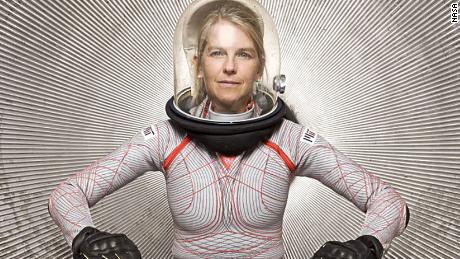(CNN)Adidas is going above and beyond the confines of Earth and looking to the stars to push the boundaries of innovation.
The apparel company is launching a multi-year partnership with the International Space Station (ISS) US National Laboratory.
"The partnership was formed because of the shared focus on innovation between Adidas and the ISS US National Lab and our joint dedication to Open Source creation," said James Carnes, vice president of global brand strategy for Adidas. "The initial conversations led to the idea of maximizing the unique lab characteristics of the International Space Station, like microgravity, for product research with our background in human performance for athletes."
Phase one
The first phase of the partnership will focus on product innovation by testing products in microgravity. Microgravity is the condition in which people or objects appear to be weightless, according to NASA.
Adidas delivered soccer balls to the ISS during a cargo mission earlier this year in order to run experiments in an attempt to extend the understanding of flight characteristics beyond Earth.
"The unique conditions of space provide the ideal environment to discover the unknown," said Christine Kretz, vice president of Program and Partnerships of the International Space Station US National Laboratory. "For example, microgravity is the only condition in which we can observe specific experiments like the behavior of a spinning soccer ball without interrupting airflow and external supports holding it in place. Having control of certain variables allows us to conduct tests and collect insights that aren't possible on Earth."
Without gravity distorting the shape and flight path of the ball and air resistance affecting the ball's flight spin, researchers are able to concentrate on testing other variables.
Adidas may be able to incorporate what they learn from these tests into the design of the panel shape of the ball, the surface and texture design, and the material to engineer future balls.
Carnes said that as the first test of its kind on sports equipment, the company is still processing the test results for the ball. And they already have a different test planned.
First to space
Adidas will be the first brand to test improvements to footwear in space.
The company plans to test its Boost technology, which is the foam the company uses to cushion some of its most popular and comfortable shoes, without the distraction of gravity. This could influence the performance and comfort of existing models while paving the way for innovation of new products.
"Beyond the Earth's atmosphere, extreme conditions in microgravity and temperature allow for unique exploratory testing that can only be achieved in space," said Carnes. "This will manifest itself in technology and process innovations for how we make sneakers, advancements in apparel like compression garments, extreme temperature management of both footwear and apparel, and pioneering sustainable materials and circular processes."
The tests are slated to begin early next year, and astronauts will experiment in order to test if it's possible to produce Boost midsoles with regions of different particle sizes, which Adidas says could theoretically optimize performance and comfort.
"We know that the space-based environment of the orbiting laboratory promotes profound changes that affect all scientific disciplines," Kretz said. "What is exciting about this collaboration is the targeted nature of Adidas' research with its Boost technology. What they learn could have very near-term impacts on the company's future product lines that could benefit athletes all over the world."
Pushing the boundaries of human performance
Adidas said it plans to research human performance and sustainability through the physical training regimen developed for astronauts.
Astronauts must undergo a rigorous training program in order to prepare for the harsh conditions of space, and Adidas hopes to improve endurance and strength training by studying the conditions required to prepare for space travel.
The company also plans to explore the range of motion in the human body and how muscle development and atrophy are affected without gravity.
"This will have an impact on how we design and develop things like compression apparel for muscle enhancement and recovery," Carnes said. "We are also inspired by the recent increase of women astronauts joining space programs, which could potentially enable exploration with a balanced look at specific biomechanical movements of both men and women throughout the entire journey."
Adidas hopes to use this information to help athletes better prepare, perform and recover.
Sustainability
Adidas has made a commitment to being environmentally friendly. The company has a long-running partnership with the organization Parley, which focuses on recycling ocean plastics and using them to create apparel and sneakers.
The company also recently launched the Adidas Futurecraft Loop, which is the company's first recyclable shoe.
Now the company hopes its partnership with the ISS will yield takeaways for more sustainable manufacturing.
Carnes said that Adidas hopes to "pioneer a whole new approach to sustainability that can only happen in conditions where every gram of material needs to be accounted for, reused, or repurposed."
"At Adidas, we believe that through sport we have the power to change lives, and we want to learn how to make sport accessible to everyone, wherever humanity goes -- Earth, space and beyond," Carnes said.










